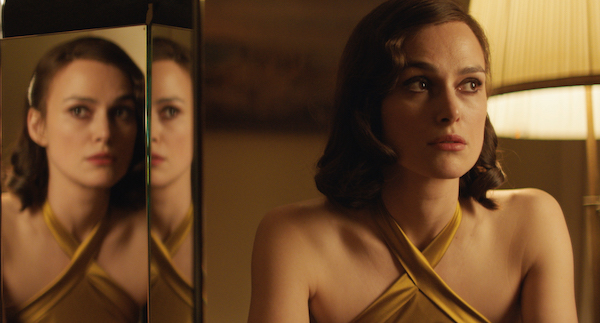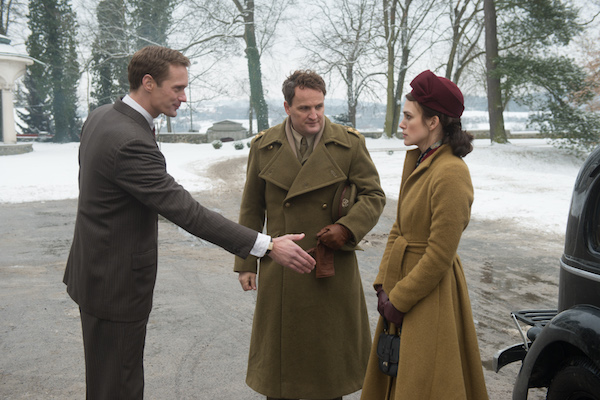When French critics railed against a “cinema of quality” sixty years ago, they could have been complaining about a movie like The Aftermath. Set in war-ravaged Hamburg, this posh, pretentious soap opera does everything the filmmakers set out to do. Clothes, sex, mansions, tears — they’re all here, as glamorous as a spread in Vogue or a Chanel ad.

Pedigree is all in a cinema of quality, and The Aftermath has pedigree in spades. A smoldering Keira Knightley evokes the high-toned Atonement. Jason Clarke resurrects his tone-deaf husband bit from any number of films (cf. Mudbound). Here’s Tarzan himself, Alexander Skarsgård, to add a little upper-class beefcake while his dad is Out Stealing Horses.
The Aftermath is adapted from Rhidian Brook’s novel, optioned by Sir Ridley Scott and then handed down to director James Kent, who plumbed this field before with Testament of Youth. And co-presenter BBC Films ensures a lush, aspirational patina.
As in the bird’s-eye-view of bombed-out Hamburg that opens the movie. The slow, stately drift over ruins wants to evoke a “tsk, tsk” from viewers without involving them too deeply in the blood and guts of actual conflict. The extras sifting through rubble behind CG snow flurries, the barrels blazing for warmth, the buses and trucks groaning by are all dressing, background, local color, ridiculously expensive travelogue fodder. They are the backdrop to a heavy-breathing but relatively chaste and deadly dull romantic triangle.

Despite its nods to famine, disease, xenophobia, vigilantes, and general upheaval, The Aftermath is firmly Knightley’s film. She’s Rachael Morgan, grieving over the loss of her child during the London Blitz. She thinks she wants to blame the Germans, all murderous Nazis in her eyes. Only she’s really angry at her workaholic husband Lewis (Clarke), just about the only enlightened British officer in post-WWII Germany. He’s never there when she needs him, preferring to put down street rebellions or protect suspects or uphold British honor to watching her teary-eyed, tossing china in a drafty dining room.
Poor Rachael must also cope with surly servants, snide officers’ wives, huffy natives, that angry Freda, hairdressers, drivers, and the rest of a world that doesn’t seem to understand that she is not only grieving, but has physical desires as well.
The Morgans have requisitioned a riverside mansion from architect Stephan Lubert (Skarsgård), a widower who chops firewood, designs modernist buildings, noodles over a Steinway, holds a torch for his fire-bombed wife, and fumbles care for his angry and confused teenage daughter Freda (Flora Li Thiemann). With Morgan gone all day quelling uprisings, it’s only a matter of time before Rachael falls into Lubert’s arms. If she had a bodice he would rip it.
The Aftermath is just that oblivious. All the narrative feints toward Hitler sects; short, bitter and therefore overcompensating intelligence officers; virginal young soldiers; class envy; the origins of the Cold War — they exist only to let Rachael unleash her desires.
It’s not the setting and period that are at fault here. Think of how a film like The Third Man cast a wider net with an unerring eye and yet far more empathy towards its soldiers and Viennese alike. Nor are the filmmaking skills. Cinematography (despite overly flattering lighting and arty compositions), production design (at times a bit too Sound of Music kitsch), music (yes, it’s maudlin), and costumes (like those you’d find in The Crown) all have the same level of “quality.”
That “quality” may why The Aftermath feels uninspired, inert, irrelevant. Destroying Hamburg seems like a high price to pay so a housewife can put her dead boy behind her, indulge her sexual fantasies, and reconcile with a newly sensitized husband.


